|
|
|
Sort Order |
|
|
|
Items / Page
|
|
|
|
|
|
|
| Srl | Item |
| 1 |
ID:
192279
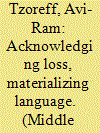

|
|
|
|
|
| Summary/Abstract |
This article focuses on Rabbi Yosef Hayyim's discussions of translation and hermeneutics, as a reflection of the broad movements between languages throughout the Ottoman Empire and the Indian Ocean, and the linguistic inequalities that characterized them. Reading Hayyim against his Baghdadi context, considering the printing and translational activities of the British missionaries of the London Society for Promoting Christianity amongst the Jews and the hermeneutics that were developed in the Baghdadi Salafiyya, I argue that Hayyim's opposition to the translation of Jewish Kabbalistic knowledge should not be seen as a conservative approach that prevents its popularization, but as an understanding of the linguistic power relations involved within the act of translation. Juxtaposed vis-à-vis his uses of Arabic translations in other responsas and his call for the teaching of standard Arabic in Jewish schools in Baghdad, that cohered with the Nahdawi perception of Arabic as a major aspect of the Ottoman Mashriq Arab political community, I argue that these incidents reflect different intersections of languages and power that occurred in the urban sphere of Ottoman Baghdad.
|
|
|
|
|
|
|
|
|
|
|
|
|
|
|
|
| 2 |
ID:
108019
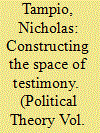

|
|
|
|
|
| Publication |
2011.
|
| Summary/Abstract |
How do we conceptualize distinctions between religious-political territories in the contemporary world when old categories-such as Islam and the West, or dar al-Islam and dar al-harb-precipitate misunderstandings and conflicts? In this essay, I consider Tariq Ramadan's argument that Muslims must enact an intellectual transformation along the lines of Kant's Copernican revolution and thence create concepts-such as the space of testimony (dar al-shahada)-to facilitate interreligious dialogue, cooperation, and respectful contestation. The essay aims to illuminate the nature of Ramadan's political theory and dispel the claim that he is a Muslim Martin Luther; to imagine the contours of a future political-intellectual movement that integrates elements of the European Enlightenment and the Arab Nahda; and to envision how Muslim and non-Muslim political theorists may combat political Manichaeanism without denying the reality and importance of contending ethical visions and political identities.
|
|
|
|
|
|
|
|
|
|
|
|
|
|
|
|
| 3 |
ID:
163250
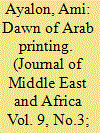

|
|
|
|
|
| Summary/Abstract |
The adoption of printing in the Ottoman Arab provinces in the nineteenth century portended a cultural transformation with profound implications, known as the nahda. Focusing on the Syrian town of Tripoli (Tarabulus al-Sham) as a case study, the article examines the historic cultural change from a peripheral vantage point. It looks at the impact of Arab printing and publishing, which evolved primarily in Cairo, Alexandria, and Beirut, on a community on the fringe of cultural change and examines its cultural interrelationship with these centers. Its findings show that, more than acting as mere consumers of print, Tripoli residents in substantial numbers took an active part in the discourse on social and cultural dilemmas which printing facilitated across the region, before adopting similar novelties in their own town toward the end of the century. The probe casts light on the manifold process by which printing, its products, and its diffusion mechanisms spread throughout the region. As printing was a key channel for circulating news and views, the study also affords a credible notion of the role that communities away from the production epicenters played in the nahda.
|
|
|
|
|
|
|
|
|
|
|
|
|
|
|
|
| 4 |
ID:
141511
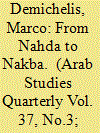

|
|
|
|
|
| Summary/Abstract |
The Governmental Arab College of Jerusalem is a little-known constructed space that emerged and then disappeared in just a few decades, a remarkable while extremely limited time if we reflect on the ancient history of the town that hosted it. However, it would be a great mistake not to consider these 30 years of history, from 1918 to 1948, and especially the wealth of cultural consciousness that the College was able to instill in its students. Ihsan Abbas (1920–2003), Ismail Ragib Khalidi (1916–1968), ‘Abdul Latif Tibawi (1910–1981), Irfan Shahid (1926) as academics, and Haidar Abdel Shafi (1919–2007), Halil-Salim Jabara (1913–1999), Hasib Sabbagh (1920–2010) etc. as politicians and activists are some of the most important names in Arab Palestinian culture and politics of the twentieth century, and all of them studied at the Arab College of Jerusalem. In this article, I would like to focus attention on the importance of this secondary/preparatory school, the social and cultural values that the teaching body was able to impart, and the role it played within the increasing and violent debate that the Arab College ignited concerning the growing Arab Palestinian-Jewish conflict in the first half of the twentieth century under the British Mandate. The Palestinian intelligentsia that was shaped within the Arab College symbolizes a cultural elite that, even if it would learn what it means to live as refugees, continued to work in different ways on its own cultural tradition. A key subject in understanding the main reasons behind the roots of identity within this divided city.
|
|
|
|
|
|
|
|
|
|
|
|
|
|
|
|
| 5 |
ID:
166763
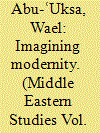

|
|
|
|
|
| Summary/Abstract |
This article employs the methodology of conceptual history to contest two of the most common theoretical approaches dominating our understanding of modernity in the field of Middle Eastern studies. The first approach relies on the assumption of incompatibility between modernity and Islam and captures Arab modernity using concepts such as ‘adoption’. The second understands Arab modernity through concepts such as ‘imitation’, contending that it is a legacy of Western imperialism. This article challenges both theories by examining the genealogy of tamaddun (civilization, being civilized), a pivotal concept used in nineteenth-century Arabic to imagine modernity. The genealogy of tamaddun elucidates that medieval paradigms derived from the concept of madina (polity) were rediscovered, reimagined, and reused in the context of the rise of the nation-state and the challenge of Western imperialism. The article suggests understanding Arab modernity and its critique from within, rather than outside of, the temporality of the historical condition.
|
|
|
|
|
|
|
|
|
|
|
|
|
|
|
|
| 6 |
ID:
193489
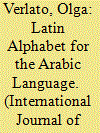

|
|
|
|
|
| Summary/Abstract |
This article explores early attempts to romanize the Arabic language in late nineteenth and early twentieth-century Egypt and situates them within a global history of script reforms in the modern period. I focus on the models to write Arabic in the Latin script developed by the Cairo-based magazine al-Muqtataf between 1889 and 1897 (which, to the extent of my knowledge, have never been examined before), relating them to the responses they elicited from the magazine's readers and some of the romanization practices found in advertising, commercial displays in the streets, and governance at the time. I demonstrate that, in this period, romanized Arabic was envisioned as an original way to pursue financial profit and technological efficiency, confront European knowledge production, and redefine the standing of Arabic within transregional publishing networks that encompassed different languages and alphabets. This analysis thus offers an alternative geography of script reform that supersedes the national framework.
|
|
|
|
|
|
|
|
|
|
|
|
|
|
|
|
| 7 |
ID:
187770
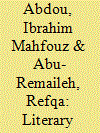

|
|
|
|
|
| Summary/Abstract |
This article delves into the pre-Nakba literary scene of the 1930s and 1940s by way of its literary periodicals. Following the work of Hanna Abu Hanna and Ishaq Musa al-Husseini, the article posits periodicals as a primary, albeit understudied, site of Palestinian literary production. Prior to the Nakba, the Palestinian literary landscape experienced a small-scale local nahda in the form of adab maqalat (periodical literature) rather than adab mu’allafat (monograph/book-form literature). However, due to the ruptures of 1948, this formative period of adab maqalat has been unexplored and remains disconnected from Palestinian literary histories. In the context of a larger project that reconnects fragmented “black hole” periods of Palestinian literary history, this article takes a step toward sketching the major elements of Palestine’s literary landscape before the Nakba.
|
|
|
|
|
|
|
|
|
|
|
|
|
|
|
|
| 8 |
ID:
188165


|
|
|
|
|
| Summary/Abstract |
In Egyptian popular history and culture, Qasim Amin is often referred to the “father of feminism” or the “liberator of women.” However, this was not always the case. Upon his death in 1908, a different legacy emerged in many early eulogies, speeches, biographical sketches, and commemorations of Amin's life. In this early framing of Amin's legacy, his two most famous books were celebrated in ways that minimized the “woman question” while highlighting other aspects of his reforms and work. This allowed Amin's 1908 contemporaries to overlook the divisiveness of his earlier positions in favor of a new sort of fraternal solidarity—one that served the interests of certain political and intellectual male elites. For many of these writers—with a few notable exceptions—Amin was a quintessential reformer and thinker whose interest in the status of women was important insofar as it spoke to the ethos of his intellectual and political projects, not what it could do for women.
|
|
|
|
|
|
|
|
|
|
|
|
|
|
|
|
|
|
|
|
|